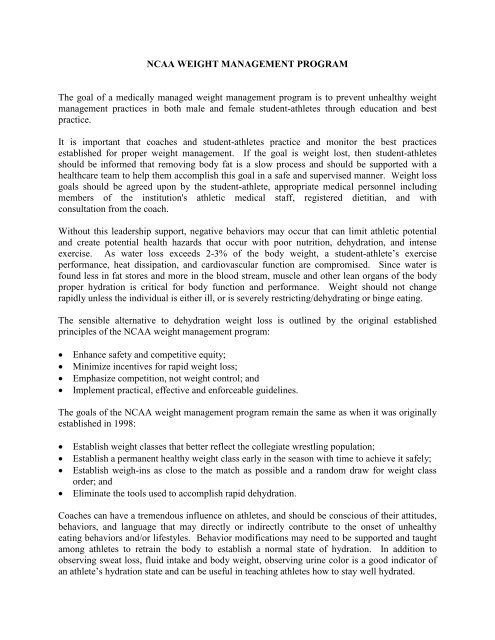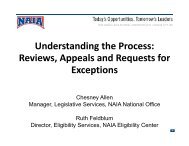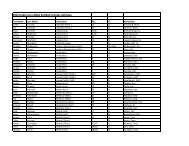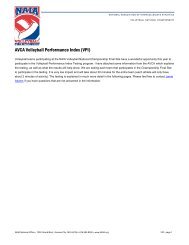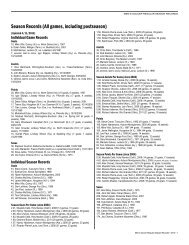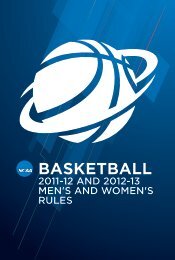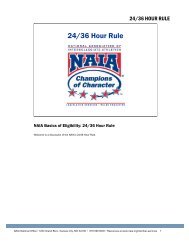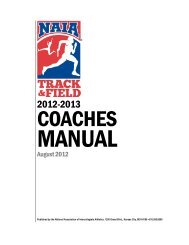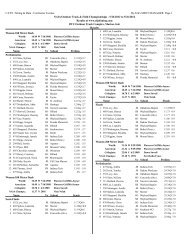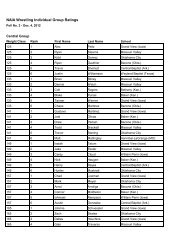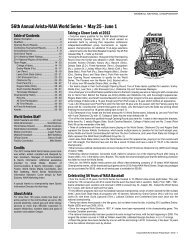NCAA Wrestling Weight Management Program For 2011 - NAIA
NCAA Wrestling Weight Management Program For 2011 - NAIA
NCAA Wrestling Weight Management Program For 2011 - NAIA
Create successful ePaper yourself
Turn your PDF publications into a flip-book with our unique Google optimized e-Paper software.
<strong>NCAA</strong> WEIGHT MANAGEMENT PROGRAM<br />
The goal of a medically managed weight management program is to prevent unhealthy weight<br />
management practices in both male and female student-athletes through education and best<br />
practice.<br />
It is important that coaches and student-athletes practice and monitor the best practices<br />
established for proper weight management. If the goal is weight lost, then student-athletes<br />
should be informed that removing body fat is a slow process and should be supported with a<br />
healthcare team to help them accomplish this goal in a safe and supervised manner. <strong>Weight</strong> loss<br />
goals should be agreed upon by the student-athlete, appropriate medical personnel including<br />
members of the institution's athletic medical staff, registered dietitian, and with<br />
consultation from the coach.<br />
Without this leadership support, negative behaviors may occur that can limit athletic potential<br />
and create potential health hazards that occur with poor nutrition, dehydration, and intense<br />
exercise. As water loss exceeds 2-3% of the body weight, a student-athlete’s exercise<br />
performance, heat dissipation, and cardiovascular function are compromised. Since water is<br />
found less in fat stores and more in the blood stream, muscle and other lean organs of the body<br />
proper hydration is critical for body function and performance. <strong>Weight</strong> should not change<br />
rapidly unless the individual is either ill, or is severely restricting/dehydrating or binge eating.<br />
The sensible alternative to dehydration weight loss is outlined by the original established<br />
principles of the <strong>NCAA</strong> weight management program:<br />
� Enhance safety and competitive equity;<br />
� Minimize incentives for rapid weight loss;<br />
� Emphasize competition, not weight control; and<br />
� Implement practical, effective and enforceable guidelines.<br />
The goals of the <strong>NCAA</strong> weight management program remain the same as when it was originally<br />
established in 1998:<br />
� Establish weight classes that better reflect the collegiate wrestling population;<br />
� Establish a permanent healthy weight class early in the season with time to achieve it safely;<br />
� Establish weigh-ins as close to the match as possible and a random draw for weight class<br />
order; and<br />
� Eliminate the tools used to accomplish rapid dehydration.<br />
Coaches can have a tremendous influence on athletes, and should be conscious of their attitudes,<br />
behaviors, and language that may directly or indirectly contribute to the onset of unhealthy<br />
eating behaviors and/or lifestyles. Behavior modifications may need to be supported and taught<br />
among athletes to retrain the body to establish a normal state of hydration. In addition to<br />
observing sweat loss, fluid intake and body weight, observing urine color is a good indicator of<br />
an athlete’s hydration state and can be useful in teaching athletes how to stay well hydrated.


